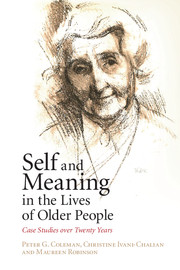Book contents
- Frontmatter
- Dedication
- Contents
- Preface and acknowledgements
- 1 Living a long life – why survive?
- 2 From self-esteem to meaning – studying psychological well-being in later life
- 3 Investigating older people's lives at the end of the twentieth century
- 4 Ageing together
- 5 Adaptation to loss of spouse
- 6 Ageing alone
- 7 Women becoming frailer
- 8 Men becoming frailer
- 9 Towards one hundred years
- 10 The future of later life: personal and policy perspectives on ageing and meaning
- Appendix: Participant characteristics
- References
- Index
Preface and acknowledgements
Published online by Cambridge University Press: 05 May 2015
- Frontmatter
- Dedication
- Contents
- Preface and acknowledgements
- 1 Living a long life – why survive?
- 2 From self-esteem to meaning – studying psychological well-being in later life
- 3 Investigating older people's lives at the end of the twentieth century
- 4 Ageing together
- 5 Adaptation to loss of spouse
- 6 Ageing alone
- 7 Women becoming frailer
- 8 Men becoming frailer
- 9 Towards one hundred years
- 10 The future of later life: personal and policy perspectives on ageing and meaning
- Appendix: Participant characteristics
- References
- Index
Summary
This book was composed much later than we originally expected. There are many reasons for the delay, not least the increasingly competing pressures of academic life. But as a result we have found ourselves writing what is essentially an historical account of a previous generation's experience of later life. However, most studies of human development, and certainly longitudinal studies such as this, eventually become works of history. Particularly in a fast-changing society, each generation's experience of the life course is clearly different from the previous one, and what constitutes an age cohort of similar social experiences increasingly narrows. Even a five-year age difference can have substantial implications in terms of a person's social attitudes and expectations.
Nevertheless, there is still much to learn from the experience of those who have lived before because fundamental human needs do not change that quickly. This applies especially to the existential challenges and dilemmas posed by ageing, how, for example, to respond to the loss of one's life partner, the onset of physical and mental frailty, and the steady approach of one's own death. Considering how previous generations faced the kind of issues that we will all one day probably encounter is of perennial interest.
There are many people to thank for the possibility of producing what we consider to be a rather unique study of ageing based as it is on detailed case studies of forty people interviewed regularly over the last twenty and more years of their lives. First, there are those who devised the original Southampton Ageing Project, especially Michael Hall, holder of the founding chair in Geriatric Medicine at the University of Southampton, and Don Marcer in the Psychology Department; we also thank Schwarzhaupt of Cologne, the generous first sponsor of the initial data collection and analysis over the years 1977–80. Many contributed to this first exercise in conducting a longitudinal study of ageing in Southampton including Roger Briggs, Peter Coleman, Fiona Everett, Ros Gray, John Harris, Terry McEvoy, Bill MacLennan, Joan Punnett, Maureen Robinson, Mary Scarborough and John Timothy.
- Type
- Chapter
- Information
- Self and Meaning in the Lives of Older PeopleCase Studies over Twenty Years, pp. ix - xPublisher: Cambridge University PressPrint publication year: 2015



